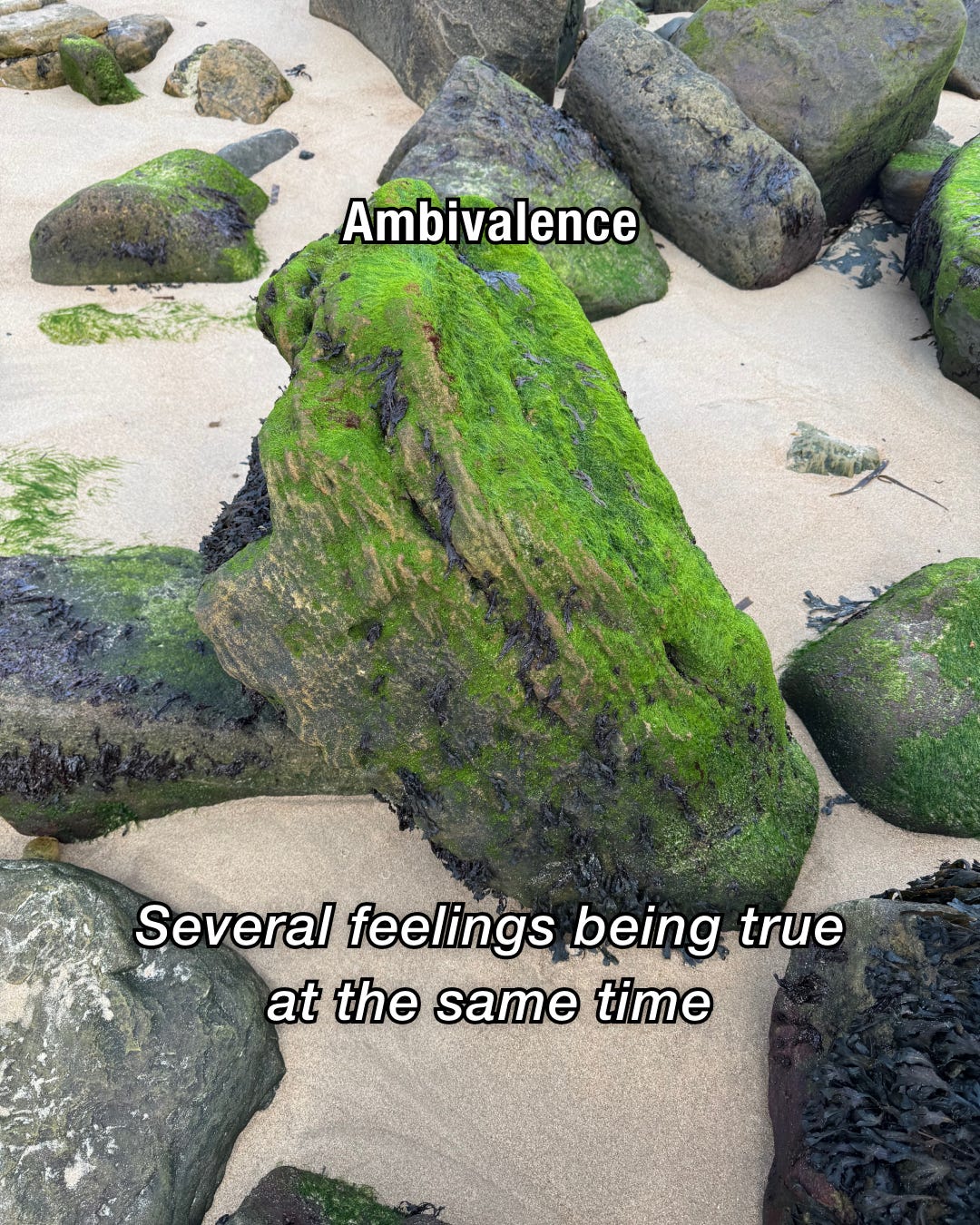When our actions don’t match our intentions it’s often because there is a more difficult feeling beneath the surface we are trying to ignore, or scared to face. In this state of resistance to ‘what is’, we become caught in a perpetual no man’s land, where we cannot grow.
Ambivalence tends to show up in patterns like lateness, indecision, resentment, and self-sabotage. Keeping one foot out the door in a relationship, or disordered eating, or like me, complaining about never having enough time for my work whilst simultaneously being unable to stomach the idea of someone else collecting my daughter from nursery. I want X, but don’t yet realise that I feel Y. And I’ve been complaining about this one (the work issue) for months and only just realised what’s really lurking in the shadows of my story: guilt. Because these things are HARD to face.
Ambivalence manifests in core behaviours that usually go unchallenged in ordinary life - such as lateness - but come into sharp relief in the therapeutic framework. In therapy, everything is material. The weekly session creates a frame that reveals the gestures we make, as much as the words we use. Lateness shows up non-verbally, but it’s a loud communication—if we’re willing to listen. And not because anyone has done anything wrong, but because something important is trying to find a way in.
When we leverage our curiosity in these moments and speak directly to the unconscious subtext playing out, we immediately deepen the layer of our work. We’re daring to go towards the vulnerable underbelly. As a therapist I have learnt that the moment I move towards this place it will draw a strong response—indignation, denial, defence, and even attack. And when I’m the one being invited to look at what’s hiding in plain sight, resistance that comes first.
Resistance stems from the paradigm of right and wrong, a prohibition nestled in our psyche, and it obscures the shadow element from view, like my maternal guilt. While we are rejecting a part of ourselves and simultaneously acting it out, we are creating the world that we are also suffering from. The contract is being generated from within, but we are convinced that someone or something else stands in our way or is acting upon us. Can you hear the trap? We are in a fight with ourselves.
What we need is a third way—one that releases the ricochet of this strange loop. Within the safe holding of BodyMind Maturation Coaching, which offers a progressive, somatic approach to metabolising and integrating early trauma, there are some key steps that can take us there:
Recognise there is resistance
Take a deep breath instead of launching into defence
Turn towards the feeling moving through your body
Name the sensations: tight chest, painful throat, for example
Locate the words that come with the experience, such as ‘it’s not fair’, ‘nobody understands’, ‘stop controlling me’
Ask yourself how old am I, right now?
Let in the first memory that rises
Do not try to fix or change or understand what happened
Breathe, be the witness, let it affect you, but do not collapse into it
Be with it, keep being with it, and still keep being with it
Watch the grip of panic/anger/fight loosen
This is the beginning of being able to own what lives within you, rather than being lived by it, and in doing so we become consciously aware of the past in the present. In my professional experience, and in my own personal process, the impact this creates is a form of liberation. Not the idealised kind, where all is rewritten, but one where we seem to be develop the capacity to be present, however life is unfolding.
This process is never about getting rid of the past (which would simply strengthen our resistance to what has already happened) but deepening our relationship to our story, so that we can integrate it consciously. It’s a kind of meaning-making that psychotherapy is already familiar with, but on a much deeper physical and ontological level.
Integration is the antidote to ambivalence, precisely because it works to include what has been excluded. Rather than thinking we need to be one or the other, there is relief in allowing space for both—longing for connection AND fearing being seen in relationship, loving your parent AND feeling let down by their absence, wanting to get to the root of your anxiety in therapy AND being terrified of going there.
In a world that demands certainty, the complexity and nuance of holding the tension of opposites can feel deeply unfamiliar, but it’s the mark of a mature being. No longer acting out our pain in the space between others, but having the capacity to sit with unwelcome feelings - like guilt, shame, disgust and judgement, and in doing so, neutralise their power.
If this work speaks to you—if you are ready to step beyond surface-level change and engage in deep, embodied, honest work—I have one space open for someone ready to explore BodyMind Maturation Coaching at this level. These places only come up occasionally, so if that’s you, email me and we’ll set up a time to speak.




